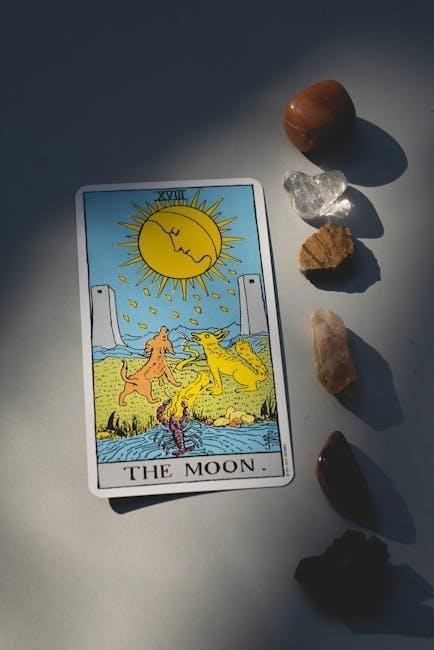Alchemy is an ancient practice blending science and mysticism, aiming to transform base materials into noble ones and seeking philosophical truths. It combines magical and practical elements.
1.1 What is Alchemy?
Alchemy is an ancient practice that blends science, mysticism, and philosophy, aiming to transform raw materials into refined forms. Rooted in Hermeticism, it seeks to unlock nature’s secrets and achieve perfection. Alchemists pursue transmutation, such as turning base metals into gold, and the creation of the Philosopher’s Stone. This art combines practical experiments with spiritual growth, exploring the mysteries of matter and life. It is both a scientific inquiry and a quest for enlightenment, offering insights into the universe and human potential.
1.2 The History and Evolution of Alchemy
Alchemy’s roots trace back to ancient civilizations, blending Greek philosophy, Egyptian metallurgy, and Chinese medicine. It evolved through the Islamic Golden Age, where scholars refined its practices. In medieval Europe, alchemy became a pursuit of transmutation and spiritual growth. The Renaissance saw its decline as modern science emerged, yet its principles influenced chemistry. Today, alchemy is rediscovered in popular culture, symbolizing transformation and self-discovery, bridging ancient wisdom with contemporary interests.
Key Concepts in Alchemy
Alchemy revolves around the Four Elements (Earth, Water, Fire, Air) and the Three Principles (Sulfur, Mercury, Salt), forming the foundation of its transformative processes and theories.
2.1 The Four Elements: Earth, Water, Fire, Air
The Four Elements—Earth, Water, Fire, and Air—are foundational concepts in alchemy, representing the building blocks of nature. Earth symbolizes stability and structure, Water embodies fluidity and transformation, Fire signifies energy and purification, and Air represents intellect and movement. These elements are seen as the essence of matter and energy, guiding alchemical processes and the pursuit of balance in both material and spiritual realms.
2.2 The Three Principles: Sulfur, Mercury, Salt
The Three Principles of alchemy—Sulfur, Mercury, and Salt—are central to its philosophy. Sulfur represents the active, transformative force, often linked to energy and will. Mercury embodies the passive, fluid aspect, associated with adaptability and change. Salt symbolizes the material foundation, grounding the process in physical reality. Together, these principles guide the alchemical process of transformation, balancing opposites to achieve harmony and spiritual growth, while also influencing material transformations in laboratory practices.

The Goals of Alchemy
Alchemy seeks to transform base materials into perfection, such as creating the Philosopher’s Stone for immortality and the Elixir of Life for eternal youth and vitality.
3.1 The Philosopher’s Stone
The Philosopher’s Stone is alchemy’s most legendary object, believed to transform base metals into gold and grant immortality. It symbolizes perfection and spiritual enlightenment, representing the ultimate alchemical achievement. Many alchemists sought this elusive substance, viewing it as both a physical and metaphysical goal. Its creation was thought to require profound knowledge of nature and divine inspiration, making it a central focus of alchemical pursuits for centuries.
3.2 The Elixir of Life
The Elixir of Life is a legendary alchemical substance believed to grant eternal youth, vitality, and immortality. It was sought to cure diseases and extend lifespan. In Chinese alchemy, it was linked to medicine and spiritual harmony, while European alchemists often connected it to the Philosopher’s Stone. The Elixir symbolizes the quest for perfection and longevity, blending physical health with spiritual transformation. Its creation was seen as the ultimate achievement, reflecting alchemy’s dual pursuit of material and metaphysical goals.
Alchemy in Different Cultures
Alchemy evolved uniquely across cultures, with European practices focusing on metal transmutation and Chinese alchemy emphasizing medicine and spiritual harmony. Each culture adapted alchemical principles to their philosophies.
4.1 European Alchemy
European alchemy focused on transforming base metals into noble ones like gold and sought the Philosopher’s Stone for eternal life. Rooted in Hermeticism, it emphasized spiritual growth and the Emerald Tablet’s wisdom. Alchemists like Nicolas Flamel and Isaac Newton explored these mysteries, blending science and mysticism. This practice laid the groundwork for modern chemistry while maintaining its esoteric appeal, symbolizing humanity’s quest for perfection and transcendence through material and spiritual transformation.
4.2 Chinese Alchemy
Chinese alchemy, known as “Waidan” or “Neidan,” focused on medicine, immortality, and spiritual enlightenment. It emphasized harmony with nature and the balance of Yin-Yang energies. Practitioners sought the Elixir of Life to attain longevity and enlightenment. Chinese alchemy integrated Taoist philosophy, Qigong, and meditation, distinguishing it from European practices. Its holistic approach aimed to transform both body and spirit, reflecting the pursuit of inner harmony and external mastery, blending practical experimentation with deep spiritual insights.

Spiritual and Philosophical Aspects
Alchemy extends beyond material transformation, embracing spiritual growth and philosophical inquiry. Rooted in Hermeticism, it seeks self-transformation, inner balance, and unity with the divine, guiding seekers toward enlightenment and harmony.
5.1 Hermeticism and the Emerald Tablet
Hermeticism, rooted in the teachings of Hermes Trismegistus, forms the spiritual backbone of alchemy. The Emerald Tablet, a cornerstone text, outlines the principle of “As above, so below,” linking the macrocosm and microcosm. This philosophy emphasizes unity, transformation, and the interconnectedness of all things. It guides alchemists to seek not only material transmutation but also spiritual enlightenment, viewing the process as a mirror for inner growth and self-realization. These teachings remain central to alchemical thought and practice today.
5.2 Self-Transformation and Inner Alchemy
Inner alchemy focuses on the transformation of the self, viewing the alchemist as the primary material to refine. It emphasizes spiritual purification, introspection, and emotional healing. By aligning with universal principles, practitioners aim to transcend base qualities like fear and anger, achieving a state of balance and enlightenment. This process mirrors the alchemical stages of material transformation but applies them to the soul, fostering self-awareness and inner harmony. It is a journey of personal growth and spiritual evolution.
Practical Alchemy for Beginners
Begin with basic tools like flasks and crucibles. Start with simple processes like calcination and dissolution. Explore resources like books and videos for step-by-step guidance.
6.1 Basic Tools and Equipment
To begin practicing alchemy, you’ll need essential tools like glass flasks, crucibles, and heating equipment. A reliable heat source, such as a Bunsen burner or electric heater, is crucial for processes like calcination. Additionally, glassware for mixing and storing materials is necessary. Measuring tools, like scales and pipettes, ensure precision. Protective gear, including gloves and goggles, is vital for safety. Start with basic, affordable equipment and gradually upgrade as you gain experience and confidence in your practice.
6.2 Simple Alchemical Processes: Calcination, Dissolution, Separation
Begin with calcination, heating materials to remove moisture and impurities. Next, dissolution involves soaking substances in a solvent to break them down. Separation follows, isolating elements through methods like filtration or evaporation. These steps form the foundation of alchemical work, helping you understand material transformations. Start with simple substances to practice these processes, gradually refining your technique. Patience and attention to detail are key to mastering these essential alchemical procedures.
Modern Applications of Alchemy
Alchemy inspires modern chemistry and spirituality, offering tools for personal growth and self-transformation. Its principles are applied in psychology, holistic health, and creative practices, blending tradition with innovation.
7.1 Alchemy in Chemistry and Science
Alchemy laid the groundwork for modern chemistry by exploring element transformations and chemical reactions. It introduced laboratory techniques like calcination and distillation, influencing the development of the periodic table. Early alchemists discovered substances like phosphorus and sulfur, paving the way for scientific advancements. Their experiments with metals and minerals established foundational principles used in chemistry today, bridging the gap between ancient mysticism and modern scientific inquiry.
7.2 Alchemy in Spirituality and Personal Growth
Alchemy extends beyond material transformation, offering a spiritual path for self-discovery and inner growth. It emphasizes refining the soul, transcending base qualities like fear and anger, and achieving harmony with nature. Through introspection and meditative practices, alchemy guides individuals toward enlightenment and balance. Its principles inspire personal transformation, encouraging seekers to align with universal truths and embrace their higher potential, making it a timeless tool for spiritual evolution and holistic well-being.

Alchemy in Popular Culture
Alchemy captivates modern media, appearing in games like Little Alchemy and Potion Craft, as well as in literature and film, inspiring creativity and curiosity worldwide.
8.1 Alchemy in Video Games: Little Alchemy, Potion Craft
Alchemy captivates gamers in titles like Little Alchemy and Potion Craft, where players combine elements to create new materials. These games inspire creativity and logical thinking, offering a fun introduction to alchemical principles. Little Alchemy challenges users to discover hundreds of items by mixing basic elements, while Potion Craft focuses on brewing potions using alchemical tools. Both games simplify complex concepts, making them accessible to beginners. They blend education with entertainment, sparking curiosity about alchemy’s transformative power.
8.2 Alchemy in Literature and Film
Alchemy captivates audiences in literature and film, often blending magic with science. Works like Fullmetal Alchemist explore alchemical themes of transformation and redemption. Films and books frequently use alchemy as a metaphor for personal growth or a quest for power. These stories inspire curiosity about alchemy’s mysteries, simplifying complex ideas for a broad audience. They highlight alchemy’s timeless appeal, making it a popular theme in modern storytelling and cultural narratives.

Getting Started with Alchemy
Begin your alchemical journey with foundational resources like books and online courses. Start by understanding basic principles, then gradually explore practical experiments and spiritual practices.
9.1 Resources for Beginners: Books, Videos, and Online Courses
Start your alchemical journey with essential resources. Books like “Alchemy for Beginners” and “The Art of Alchemy” provide foundational knowledge. Online courses on platforms like Udemy and Coursera offer structured learning. YouTube channels and video tutorials demonstrate practical processes like calcination and dissolution. Explore forums and communities for guidance and support. Begin with simple experiments using affordable tools and ingredients. Combine theoretical study with hands-on practice to deepen your understanding of this ancient craft.
9.2 Tips for Successful Alchemical Practice
Begin with simple experiments and build gradually. Stay curious and patient, as alchemy is a journey of discovery. Keep a detailed journal to track progress and insights. Focus on understanding the fundamental principles before advancing. Practice mindfulness and intention, as alchemy is both physical and spiritual. Seek guidance from reputable sources and communities. Embrace failure as a learning opportunity. Combine theoretical knowledge with practical application for a holistic approach to this ancient craft.
Alchemy is a timeless journey blending science, spirituality, and self-discovery. Its principles continue to inspire modern practices, offering wisdom and transformation for those who explore its ancient craft.
10.1 The Relevance of Alchemy Today
Alchemy remains relevant today, inspiring modern spirituality, personal growth, and creativity. Its principles are applied in fields like psychology, philosophy, and even video games, fostering a deeper understanding of transformation and self-discovery. Many find meaning in its timeless wisdom, blending ancient mysticism with contemporary practices. Alchemy’s legacy continues to captivate, offering a bridge between the past and present, encouraging individuals to explore their potential and the world’s mysteries.
10.2 Encouragement to Explore Alchemy
Exploring alchemy can be a transformative journey, blending science, mysticism, and self-discovery. Whether you’re drawn to its historical roots or modern applications, alchemy offers a unique path to understanding both the material and spiritual worlds. Begin with simple practices, embrace curiosity, and delve into its timeless wisdom. Resources like books, videos, and online courses make it accessible for everyone. Let alchemy inspire you to transform your life and uncover its magical and philosophical secrets.



